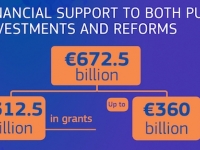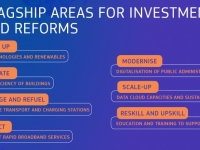Politics
EUROGROUP DISCUSES MACROECONOMIC IMBALANCES IN EURO AREA IN THE WAKE OF THE
IN THE WAKE OF THE COVID-19 CRISIS

European Commission logo (Source: European Commission)
USPA NEWS -
The Euro area finance ministers held a thematic discussion on macroeconomic imbalances in the euro area on the basis of a technical note prepared by the Commission. A Meeting was held by video conference on 18 January, Their discussion focused on the extent to which the COVID-19 crisis has exacerbated existing macroeconomic imbalances at the euro area level and the policy strategies needed to respond. While recognising that the COVID-19 crisis runs the risk of aggravating pre-existing macroeconomic imbalances in the euro area, ministers reconfirmed the need to maintain a supportive budgetary stance. Ministers also exchanged views on the preparation of the national Recovery and Resilience Plans in line with the priorities agreed in the euro area recommendation (EAR). Lastly, the Eurogroup exchanged views on the global monetary and financial system, in particular on prospects for transatlantic cooperation. Lawrence H. Summers, Harvard professor and former US Secretary of the Treasury, was invited to share his insights and experience with the Eurogroup.
THE RECOVERY AND RESILIENCE FACILITY The Recovery and Resilience Facility (the Facility) will make €672.5 billion in loans and grants available to support reforms and investments undertaken by Member States. The aim is to mitigate the economic and social impact of the coronavirus pandemic and make European economies and societies more sustainable, resilient and better prepared for the challenges and opportunities of the green and digital transitions. By offering large-scale financial support for investment and reforms, the Facility will better prepare Member States for a sustainable recovery. The European Parliament and the Council reached a political agreement in December. The Facility will enter into force when the Council and the European Parliament formally adopt the Recovery and Resilience Facility Regulation. Before that happens, the compromise text needs to be translated into all EU official languages and go through legal checks.
THE FACILITY AND NEXT GENERATION EU------------------------------------------------------------------------------------------
The Commission proposed the Facility on 27 May 2020 as the centrepiece of NextGenerationEU, a temporary recovery instrument that allows the Commission to raise funds to help repair the immediate economic and social damage brought about by the coronavirus pandemic. The Facility is also closely aligned with the Commission´s priorities ensuring in the long-term a sustainable and inclusive recovery that promotes the green and digital transitions. On 21 July 2020, the European Council reached a political agreement on NextGenerationEU, including the Facility, and the 2021-2027 long-term EU budget.
NATIONAL RECOVERY AND RESILIENCE PLANS Member States will prepare recovery and resilience plans that set out a coherent package of reforms and public investment projects. To benefit from the support of the Facility, these reforms and investments should be implemented by 2026. The plans should effectively address challenges identified in the European Semester, particularly the country-specific recommendations adopted by the Council. The plans should also include measures to address the challenges and reap the benefits of the green and digital transitions. Each plan is expected to contribute to the four dimensions outlined in the 2021 Annual Sustainable Growth Strategy, which launched this year's European Semester cycle.
“¢ Environmental sustainability
“¢ Productivity
“¢ Fairness
“¢ Macroeconomic stability
The Facility is an opportunity to create European flagship areas for investments and reforms with tangible benefits for the economy and citizens across the EU. These should address issues that need significant investment to create jobs and growth, and which are needed for the green and digital transitions. The Commission strongly encourages Member States to put forward investment and reform plans in the following areas:
Green and digital priorities
The Recovery and Resilience Facility offers an unprecedented opportunity to speed up the recovery in Europe and reinforce the commitment to the twin transitions: green and digital. The Commission will assess the national plans against the following targets:
37% for green investments and reforms
Each recovery and resilience plan will have to include a minimum of 37% of expenditure related to climate. Progress towards other environmental objectives is also important, in line with the European Green Deal.
20% for digital investments and reforms
Each recovery and resilience plan will have to include a minimum of 20% of expenditure to foster the digital transition. The Commission is developing a methodology to ensure investment is channelled to both infrastructure and digital capacities.
The European Semester and the Recovery and Resilience Facility are intrinsically linked. The publication of the 2021 Annual Sustainable Growth Strategy launched this year's European Semester. It continues last year´s growth strategy based on the European Green Deal and the concept of competitive sustainability. The Commission will assess recovery and resilience plans against the country-specific recommendations. As the European Semester and the Facility will overlap, it is necessary to temporarily adapt the European Semester. Member States are therefore encouraged to submit their national reform programmes and their recovery and resilience plans in a single integrated document, which will provide an overview of the reforms and investments that the Member State plan to undertake in the coming years, in line with the objectives of the Facility.
THE RECOVERY AND RESILIENCE TASK FORCE
The Recovery and Resilience Task Force (RECOVER) was established on 16 August 2020 within the European Commission´s Secretariat-General. RECOVER is responsible for steering the implementation of the Recovery and Resilience Facility and for coordinating the European Semester, in close cooperation with the Commission´s Directorate-General for Economic and Financial Affairs. RECOVER reports to Commission President Ursula von der Leyen.
Example of component of reforms and investments
“¢ Examples of component of reforms and investment ““ scale up
“¢ Examples of component of reforms and investment ““ power up
“¢ Examples of component of reforms and investment ““ reskill and upskill
“¢ Example of component of reforms and investments ““ Digital connectivity
“¢ Example of component of reforms and investments ““ Public administration
“¢ Example of component of reforms and investments ““ Renovation wave
“¢ Example of component of reforms and investments ““ Clean, smart and fair urban mobility
Source: European Commission
European Union Covid-19 Eurogroup Finance Commission President Ursula Von Der Lyen European Council Charles Michel David Sassoli Pdt European Parliament Chief Negotiator Michel Barnier Brexit Uk Rahma Sophia Rachdi Jedi Foster
Liability for this article lies with the author, who also holds the copyright. Editorial content from USPA may be quoted on other websites as long as the quote comprises no more than 5% of the entire text, is marked as such and the source is named (via hyperlink).









